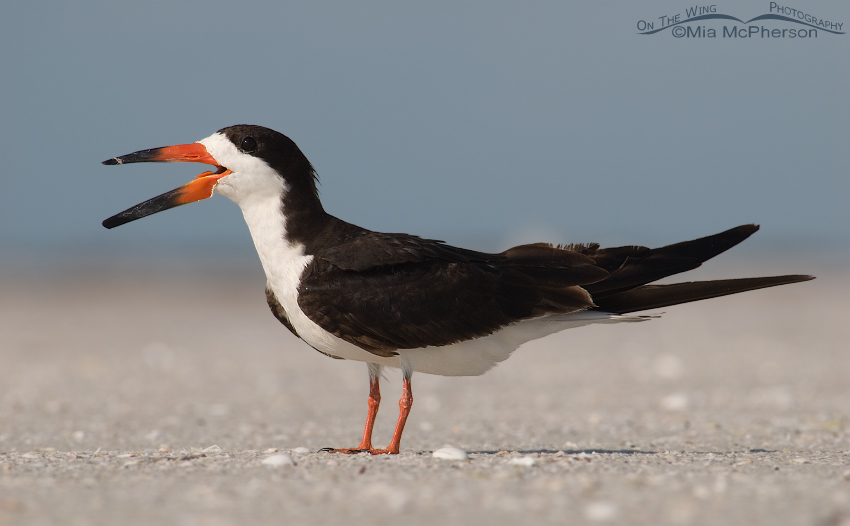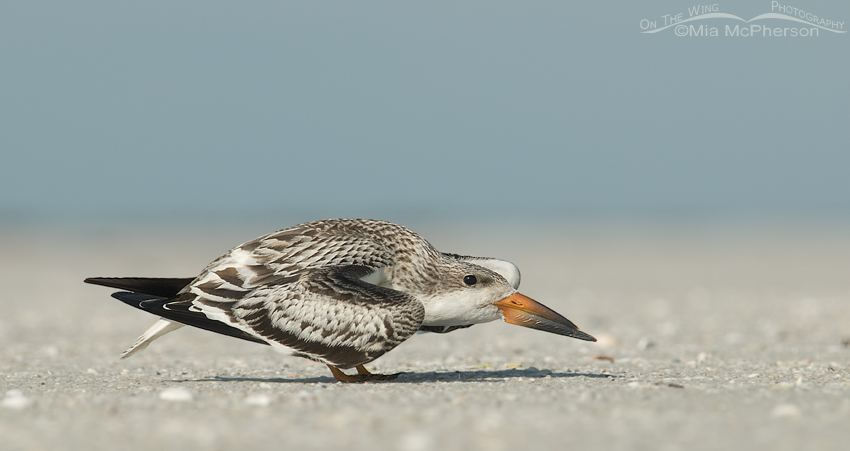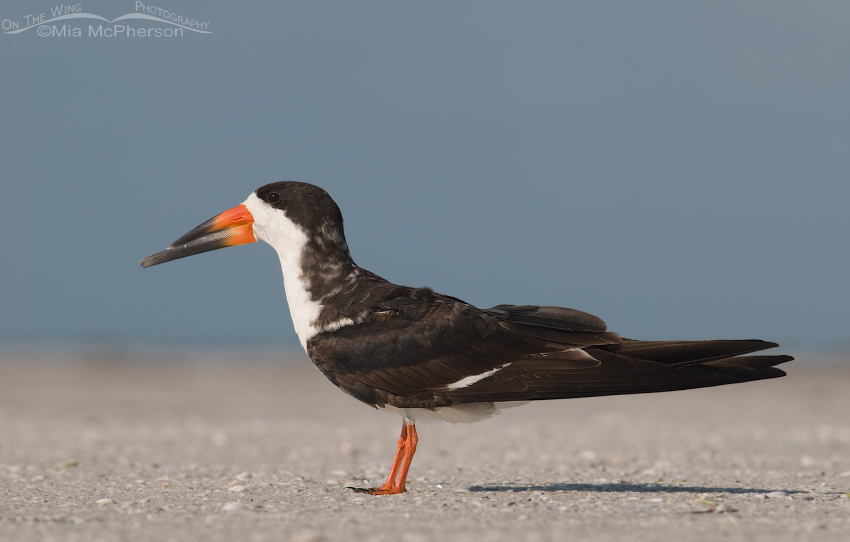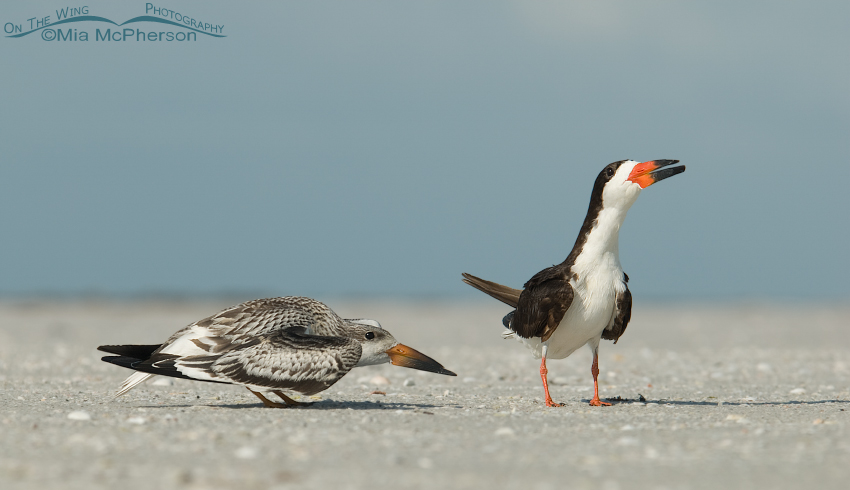 Calling adult Black Skimmer in breeding plumage – Nikon D200, handheld, f8, 1/640, Nikkor 80-400mm VR at 400mm, natural light
Calling adult Black Skimmer in breeding plumage – Nikon D200, handheld, f8, 1/640, Nikkor 80-400mm VR at 400mm, natural light
Anyone who has photographed birds during the month August in Florida knows it is hot and humid even in the early hours of the morning. And it just gets hotter throughout the day. From mid March until November I was always prepared to sweat. And sweat some more.
I suspect that is all part of being addicted to bird photography. Dedicated bird photographers will endure heat, hunger, extreme cold, blistered feet, numb fingers and much more to get their shots. I’m sure to outsiders we look crazy.
The day I took the images in this post I arrived at the north beach of Fort De Soto before sunrise to a light sea fog which burned off rather quickly and after that the heat was on. I wandered around for a bit taking images of shorebirds, egrets and pink fluffy clouds before I noticed a large mixed flock of gulls, terns and skimmers. As I walked towards them I could see hundreds of birds, some on their way out to go get food and some resting on the sand.
According to my EXIF information It was 7:15 am when I first started photographing where the flock of birds were that morning.
Many yards away from the birds I dropped down to my knees then laid on my belly and slowly sand-crawled within range. Sand-crawling is not just a way to get closer to your subject it is also low cost dermabrasion for your elbows, tummy feet and any other exposed part of your skin. It probably took me over 10 minutes of wiggling my way forward in the sand to get into a slight depression where I was close enough to the birds and low enough to get the low angle I wanted for my images.
 Juvenile Black Skimmer spying on me – Nikon D200, handheld, f7.1, 1/640, ISO 160, Nikkor 80-400mm VR at 340mm, natural light.
Juvenile Black Skimmer spying on me – Nikon D200, handheld, f7.1, 1/640, ISO 160, Nikkor 80-400mm VR at 340mm, natural light.
I had seen from a distance that there were juveniles in with the adult birds, my plan was to wiggle into that depression and stay put so that I wouldn’t disrupt the young birds or the adults who were flying in to feed them. The safety and well-being of the birds is always uppermost in my mind.
About the only movements I made were to lift my head to the viewfinder, click the shutter button, reach around to my backpack for my bottle of water to sip and to use my bandana to wipe the sweat from my brow. Long before that day I had learned that if I didn’t move much the birds were likely to come closer to me and they did that day. Dressed in light tans and khaki colors I probably began to look like I was part of the beach. Clearly my sweaty skin had enough sand stuck to it to make me look like something the tide had washed up.
I photographed Forster’s, Sandwich and Royal Terns, along with Laughing and Ring-billed Gulls that morning but my main focus was on the Black Skimmers in the large mixed flock. The juvenile skimmers were either laying down on the sand resting or begging for food when they could see or hear the adults nearby. The image above shows a juvenile moving towards one of its parents to get some food. This pose and image reminds me of an old magazine cartoon, I think it was called “Spy VS Spy”. Mad magazine perhaps? Anyway, the pose makes me laugh.
 Resting adult Black Skimmer going out of breeding plumage – Nikon D200, handheld, f8, 1/500, ISO 160, Nikkor 80-400mm VR at 310mm, natural light
Resting adult Black Skimmer going out of breeding plumage – Nikon D200, handheld, f8, 1/500, ISO 160, Nikkor 80-400mm VR at 310mm, natural light
Because I was laying in a slight depression which was below the birds I was able to get very low angle shots. My friends say when my images have such a low angle that I must have been “Down ‘n dirty”. Well I know for sure I was dirty, I had sand everywhere! And I was laying down.
Black Skimmers are very long birds from the tip of the bill to the end of the tail and it can be quite a challenge to have enough depth of field to get all of the birds in focus, to compose the frame well and then there is the difficulty of properly exposing a black and white bird with orange legs and bill. But they are well worth the troubles to get some nice shots.
 Juvenile (L) and adult (R) Black Skimmers – Nikon D200, handheld, f7.1, 1/640, ISO 160, Nikkor 80-400mm VR at 230mm, natural light
Juvenile (L) and adult (R) Black Skimmers – Nikon D200, handheld, f7.1, 1/640, ISO 160, Nikkor 80-400mm VR at 230mm, natural light
Because I had been so still I was rewarded a few times by the birds moving closer to me than I would have approached them like the juvenile and adult bird above. It felt like an honor. My patience and laying still for so long paid off. I know I took hundreds of Black Skimmer images that morning, some I still have yet to process.
My EXIF information shows that I took my last skimmer image at 9:33 am which means I laid there in the sand and heat for two hours and eighteen minutes photographing those birds and in my mind it was worth every second, all the sand on my skin and the perspiration that at times had burned my eyes.
Maybe I am crazy to be so addicted to bird photography! A good crazy I hope.
Life is good.
Mia
Click here to see more of my Black Skimmer photos plus facts and information about this species.


Talk about commitment to the picture! I love your shots, and I’m glad that you got low to get the better angle. I made it to Fort de Soto for the first time today, what an amazing place! I spent a lot of time on my belly getting some great shots of Marbled Godwits, Semipalmated Plovers, and Dowitchers. So much fun, and I get to do it all again tomorrow!
Thank you so much Stephen. I’m tickled that you got to Fort De Soto and that you found it to be an amazing place. It will always have a special place in my heart and brings back such great memories. I hope that you got some great images!
These are so good, Mia. I especially like the last one. For each minute of that 2:18, I’ll bet that you were just mesmerized by what was in your viewfinder, and I can imagine how happy you were to be witness to these interactions. It is a wonder that no one walked in between you and the birds and scared them off!